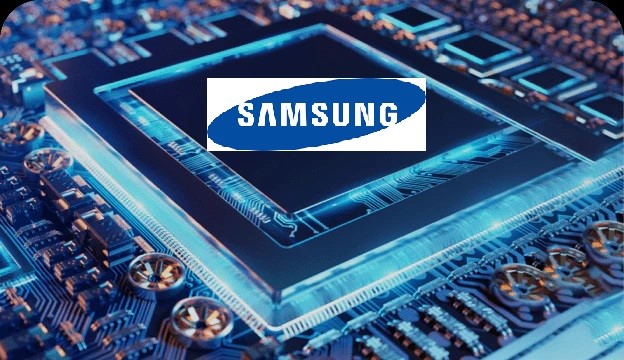In the vast starry sky of the global semiconductor industry, Samsung Electronics is undoubtedly one of the brightest stars. However, even such an industry giant is not completely immune to market volatility and industry challenges. Recently, Samsung Electronics announced a major restructuring plan for its semiconductor division, which involves significant cuts in senior management positions, a decision that not only shook the industry, but also sparked widespread discussion and attention. When analyzing this incident in depth, it is not difficult to find that behind it lies the intensification of competition in the industry and the challenges faced by enterprises.
1. Intensified competition in the industry: The field of AI chips is on fire
With the rapid development of artificial intelligence technology, the AI chip market has become a battleground for the semiconductor industry. Samsung Electronics, as the world's leading semiconductor manufacturer, is facing fierce competition from all sides in the field of AI chips, despite its remarkable achievements in many fields.
In the case of high-bandwidth memory (HBM), Samsung, although it ranks second in the global market, lags far behind its long-time rival SK hynix in market share. According to the latest market research report, SK hynix's share of the HBM market is as high as 45%, while Samsung's share is only 28%. In addition, SK hynix has also successfully won the favor of key customers such as NVIDIA, adding a lot of chips to its competition in the AI chip market.

Figure: Samsung Semiconductor's Great Change: The Secret Behind Executive Turnover and Layoffs
In addition to the HBM market, Samsung has also encountered strong competitors in the outsourcing production of custom chips. As the world's largest wafer foundry, TSMC has successfully attracted many top customers, including Apple and Qualcomm, with its advanced process technology and efficient production capacity. In contrast, Samsung's performance in the production of custom chips is much inferior, which also affects its competitiveness in the AI chip market to a certain extent.
2. Internal challenges: management redundancy and operational efficiency
While external competition is becoming increasingly fierce, Samsung Electronics is also facing many internal challenges. Among them, management redundancy and low operational efficiency have become one of the key factors restricting the company's development.
According to Samsung's internal data, as of the second quarter of 2024, its Device Solutions (DS) division has a total of 438 executives, accounting for 38% of the company's total executives. This ratio is not only much higher than the industry average, but also far higher than its competitor SK hynix. The number of executives at SK hynix during the same period was only about half that of Samsung. Management redundancy not only increases a company's operating costs, but can also lead to inefficient decision-making and difficulty in responding quickly to market changes.
In order to meet this challenge, Samsung Electronics decided to conduct a thorough audit and restructuring of the DS division. The audit, which was personally led by Vice Chairman and Head of the DS Division, Chun Young-hyun, aimed to improve operational efficiency by streamlining executive positions and optimizing the business structure. According to preliminary statistics, the restructuring plan will involve the departure of at least 20% of president-level executives, which will save Samsung a lot of operating costs and is expected to improve decision-making efficiency.
3. Impact and prospects of restructuring: Challenges and opportunities coexist
This restructuring of Samsung Semiconductor will undoubtedly have a profound impact on the company's chip business. On the one hand, by streamlining management and optimizing business structure, Samsung can reduce operating costs and improve decision-making efficiency, thereby enhancing market competitiveness. On the other hand, it can also present some challenges. For example, the reduction of executive positions can lead to poor communication within the company, affecting team collaboration; At the same time, too much pursuit of short-term benefits can also weaken a company's investment in technological innovation and market responsiveness.
However, in the long run, this restructuring is undoubtedly an important strategic adjustment for Samsung Electronics. In the face of rapid changes in the AI chip market and internal performance pressure, Samsung Electronics must take decisive measures to ensure its long-term market competitiveness. Through the restructuring, Samsung can focus more on its core business and key technology areas, and increase its investment in the AI and high-performance computing markets to cope with the increasing competition in the market.
In addition, Samsung can also use the opportunity of this restructuring to optimize its global supply chain layout and improve production efficiency and quality. As the global semiconductor market continues to change and technology continues to innovate, Samsung needs to constantly adjust its strategic direction to adapt to the new market environment and customer needs.
4. Conclusion: Restructuring is a key step in the future development of Samsung Semiconductor
To sum up, Samsung Electronics' semiconductor division executive reorganization is an important adjustment to its competitive position in the semiconductor industry. In the face of rapid changes in the AI chip market and internal performance pressure, Samsung Electronics must take decisive measures to ensure its long-term market competitiveness. While there may be some challenges and uncertainties in the short term, this restructuring is expected to bring new growth opportunities and competitive advantages to Samsung Electronics in the long run.
In the future, Samsung Electronics will continue to focus on the semiconductor field and continue to introduce innovative products and services to meet the needs of customers around the world. At the same time, the company will continue to optimize its internal management and operation system to improve efficiency and competitiveness to cope with the increasingly fierce market competition and changing market environment. We look forward to seeing more brilliant achievements for Samsung Electronics in the future."






